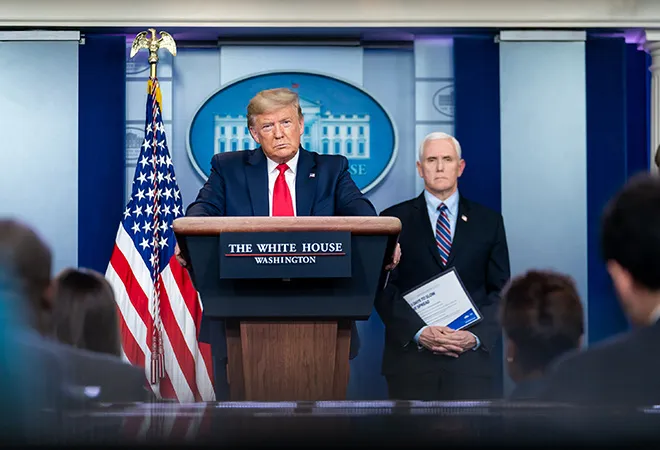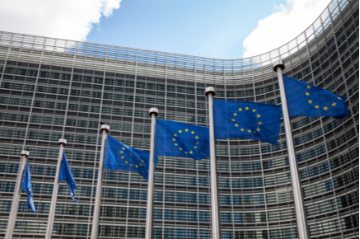
The Corona virus has hit the race for the White House hard, changing the 2020 campaign dramatically. There is a complete recalibration of strategy, resource allocation and outreach to the voters with tele-campaigning and tele-fund raisers as the new mantras.
Should candidates even appeal for a vote when Americans are worried about their lives and their livelihoods and will continue to be for weeks if not months to come? The voters are understandably fixated on the virus and politics-as-usual is no longer viable.
How will candidates sway them in the absence of election rallies, regular barbecues, town halls and gatherings at diners? E-mail contact was always the second line of defence but can it be effective as the only point of contact?
Besides taking a huge toll on life, the Corona virus is also killing what Americans call “retail politics” of kissing babies, posing for selfies and having an occasional beer at the bar with potential voters.
As a result the race for the presidency stands transformed. Virtual campaigning has replaced real life public assemblies for now and created a certain distance between the candidates and voters that could impact choices going forward. Democrats might suffer more in this changed environment.
They have to find ways to squeeze into the reality of a news cycle dominated by a single story – the Corona Virus. Constrained and restricted at home, Joe Biden and Bernie Sanders have suddenly become the “remote” candidates. They don’t have a ready platform and must create small openings where they can.
They are struggling for visibility. But why they haven’t become a constant presence on cable channels is baffling even though viewership is at its highest with people quarantined at home.
President Donald Trump, on the other hand, has a massive advantage -- he is in American living rooms daily with Corona virus briefings. He is using the briefings both to give updates and to keep his re-election bid alive.
He can be meandering, contradictory, anti-science and boastful and often plain wrong but he is there and visible. He dominates the public square – one day he declaring it will all be over soon and the next adopting a more serious demeanor.
Trump has already declared himself a “wartime” president fighting an “invisible enemy” -- a designation loaded with import. A wartime president is rarely defeated in a reelection even though this war is very different. His approval ratings have gone up, from 43% to 55%, according to an ABC poll done soon after his declaration last week.
The Democratic Party is scrambling to stay atop the changed reality. Many states have postponed their primaries to June, which leaves the question of nomination in a limbo. Sanders is yet to bow out of the race even though he doesn’t have any realistic path to the nomination. But his supporters want him to keep collecting delegates to push changes in the party platform.
Democrats are also exploring “contingency options” in case the party convention to crown the nominee cannot be held in July as planned. So far, there is no talk of postponing the Nov. 3 vote to elect the next president but Democrats do worry about Republican governors imposing new voting restrictions, which could hurt their base, to say nothing of the fear of the virus keeping voters away.
Biden, the frontrunner, has set up a studio at home to connect to voters and the media. His pivot to virtual campaigning was slow and technically challenged, something that was quickly exploited by Trump’s campaign team. Tim Murtuagh, the chief spokesman for Trump’s re-election campaign, ridiculed Biden on Twitter, saying it took him “a week to set up a camera in his house” and he wasn’t fit to control a pandemic.
But Biden is adapting fast. He has begun virtual briefings for the press and plans podcasts on policy issues in the near future. He is also meeting voters virtually and will do FaceTime with donors both big and small.
Biden is a good “retail” politician – empathetic and a listener – but how far his staff is able to translate those qualities into virtual deliverables will be key.
Given the background and the ongoing fight against the virus, the 2020 election could be decided on the basis of two major factors – spread of the Corona virus and its lasting impact on the US economy. If Trump is able to keep the virus in check by intelligent and timely responses and the death toll is kept low, he could be rewarded for simply for managing the crisis.
Trump never misses a chance to tell Americans that his ban on flights to and from China announced on Jan. 31 was the single most important decision in curbing the spread of the virus. Expert opinion on Trump’s decision varies. Critics say the virus had already silently spread to several countries and flights were operating to and from the US to those destinations.
As for the economy, the $2 trillion stimulus package, including direct payments to Americans, will soon be unfolding putting some bounce back into the stock market. If the virus is contained by the middle of the year and the economy recovers, Trump’s chances in November improve.
Equally, a Corona virus-induced recession could sink his chances as American voters look for a different leader. Currently, Trump has a monopoly on the public square and he is using it to the maximum.
The views expressed above belong to the author(s). ORF research and analyses now available on Telegram! Click here to access our curated content — blogs, longforms and interviews.




 PREV
PREV


